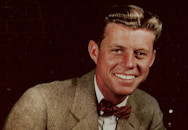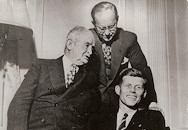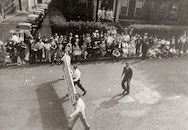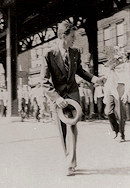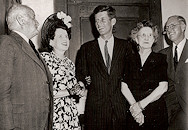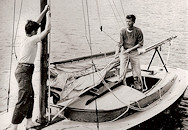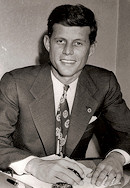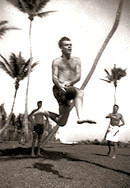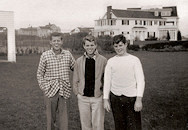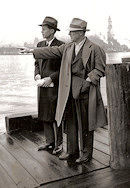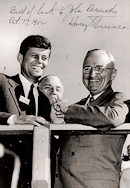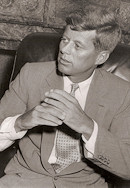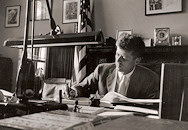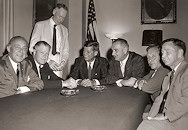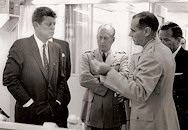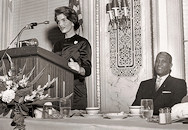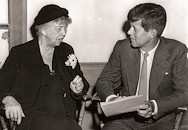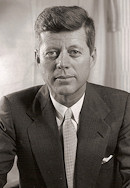![]()

![]()
Young Jack Kennedy rare color portrait.
A revealing photo shows the men behind young JFK in his bid to succeed in politics. His father, Joseph P. Kennedy Sr., stands directly behind, while John F. (Honey Fitz) Fitzgerald, a colorful politician and JFK's grandfather, is beside.
1946 - Pounding the pavement in Boston. Left - John Fitzgerald Kennedy, war hero and great-grandson of Irish immigrants, campaigns for a seat in the U.S. Congress during Boston's Bunker Hill Day parade. Right - Without breaking stride, Jack accepts a bouquet of flowers from an admirer.
Left - A typical campaign stop in a small hall, crammed full of supporters and the curious. Mid - On voting day, JFK votes with his grandparents, the Fitzgeralds. Right - All smiles after the victory, a sweep, for young Jack Kennedy over eight other candidates.
After his victory, Jack took some time off to relax at the family's summer home in Hyannis Port, Mass. Right - Brother Ted helps Jack raise the sail on the little sailboat.
In Washington, the new U.S. Congressman from the 11th Congressional District, 29-year-old John Fitzgerald Kennedy of Massachusetts. Jack was easily re-elected to the seat in 1948 and 1950.
1948 family photos. Left - At the Kennedy home in Palm Beach, Florida, Pat, Ted and cousin Joe Gargan decorate the family Christmas tree and show off Bobby's knee for the camera. Mid - Bobby makes a spectacular catch during a game of touch football, a Kennedy tradition. Right - At Hyannis Port, the Kennedy brothers, Jack, Bobby and Ted.
Left - Congressman Kennedy on an inspection tour of the Boston waterfront. Right - In 1951, JFK (in rear) in Vietnam on a fact finding tour with the French. Kennedy was critical of U.S. support of the French there, saying, "We have allied ourselves to the desperate effort of a French regime to hang on to the remnants of empire."
1952 - The rising young politician gets the nod of approval from President Harry Truman, despite Truman's great dislike for Joe Kennedy Sr. Regarding Jack, Truman declares, "There is little doubt of the great political future in store for Kennedy."
By this time, Jack is bored by the dull routine of Congress with its rigid seniority system and has set his sights on the U.S. Senate. His family rallies behind him in an all-out effort against stiff odds to defeat Republican incumbent Sen. Henry Cabot Lodge Jr., a Boston Yankee - a class of people who could trace their lineage back to the Mayflower Ship and were blatantly proud of it.
The 1952 Senate campaign. Left - Jack's sisters, Pat and Eunice go door-to-door handing out bumper stickers. Another successful tactic was a series of afternoon teas, 35 in all, hosted by Jack's mother, Rose. Mid - Rose introduces Jack to the audience of women. Right - After back surgery, Jack continued the campaign while in pain and on crutches.
In his boyhood and throughout his young life, Jack Kennedy suffered from an incredible number of health problems including; scarlet fever, diphtheria, appendicitis, malaria, jaundice, hepatitis, adrenal insufficiency, irritable stomach, a hearing problem (left ear), pet allergy (dogs), and chronic back pain. Despite it all, to the public he later defined the look of vibrant American youth, a huge accomplishment, due largely to Jack's sheer will power in overcoming his health problems.
In Washington, the new junior Senator from Massachusetts. During the successful campaign, run by his brother Bobby, Jack shook 750,000 hands. On election night, Kennedy supporters sweated as the first disappointing election returns came in and it wasn't until 5 a.m. the next morning when they knew Jack had pulled off the upset.
1955 - Senator Kennedy at his desk after another ordeal of back surgery and a lengthy hospital stay and recovery during which he produced Profiles in Courage. The book examined the lives of eight outstanding past U.S. Senators and went on to win the 1957 Pulitzer Prize for biography, greatly enhancing Jack's reputation.
During Jack's stay in the hospital, the Senate voted to censure Sen. Joseph McCarthy, the instigator of a nationwide panic regarding alleged communists in the U.S. government. Jack was absent and never cast a vote, leading to lingering criticism of his actions in not recording a vote later and in not hopping onto the bandwagon and publicly condemning McCarthy. Jack's family had ties to McCarthy. Bobby had briefly served on his staff and McCarthy had been a guest at Hyannis Port.
Daily business. Left - Attending a committee meeting with crutches placed behind him. Right - Stretched out on the sofa in Sen. Hubert Humphrey's office.
Of the many committees Jack served on, the Select Committee of the Senate to Investigate Improper Activities in Labor-Management Relations caught the public's attention as Jack, with younger brother Robert as chief legal counsel, investigated racketeering among labor union officials. Jack then sponsored a labor bill aimed at eliminating criminal practices in unions.
Left - Around the table, a gathering of politicians includes JFK and his future vice president, Lyndon B. Johnson. Mid - During a tour of Strategic Air Command's underground command post, Jack gets briefed. Right - The Senator's young wife, Jackie, makes an appearance at a Washington function. Married to JFK in 1953, her movie star looks and extraordinary charm were a huge political asset.
Left - Enjoying a joke with Vice President Richard Nixon and Boxing Champ Rocky Marciano. Right - Jack sought the political support of feisty former first lady Eleanor Roosevelt, but she scolded him for not condemning Joe McCarthy.
Jack was reelected to the Senate by the people of the Massachusetts with 73.6 percent of the vote in 1958. Senator Kennedy, politically matured now, had already tasted national politics, almost getting the nod to be vice president at the 1956 Democratic convention. When Kennedy is told he will easily get that post in 1960, he responds, "I'm not running for the vice-presidency anymore. I'm running for the presidency."
JFK Photo History
Early Years | War Hero | Politician | President
Copyright © 1996-2025 The History Place™ All Rights Reserved
Terms of use: Private home/school non-commercial, non-Internet re-usage only is allowed of any text, graphics, photos, audio clips, other electronic files or materials from The History Place.
|
|
|
|
